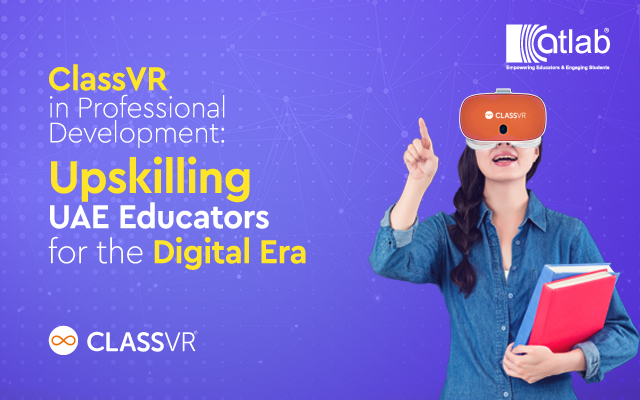We use cookies to help improve our services, make personal offers, and enhance your experience. Read more
Class VR in Professional Development: Upskilling UAE Educators for the Digital Era
September 30, 2024 156

With the world constantly adopting new technologies, it becomes crucial for educators to be one step ahead when it comes to teaching methods and tools. Virtual reality (VR) technology provides an innovative method for learning due to its ability to create an interactive environment. The UAE, as a country that actively implements new technologies into its society, will significantly benefit from incorporating VR into its professional development for teachers.
This blog will discuss VR's characteristics and how it can train UAE educators to provide a better learning experience.
What is Virtual Reality (VR)?
Virtual reality (VR) refers to an environment that mimics reality or an experience that has no resemblance to actual life. It employs computer technology to depict a physical world which the user can touch and feel through an electronic interface such as a headgear with a display within it or spectacles, gloves etc.
Key Features of VR in Education
1. Immersive Learning Experiences: A benefit of VR is that its learning experiences are interactive, and the users will be able to be influenced in different perceived environments and conditions. Unlike traditional textbooks, where a specific idea is presented in a certain way, teachers can take learners on a virtual tour of historical places, space or the human body, among others.
2. Interactive Simulations: VR lets students and teachers practise skills with interactive simulations in a safe, controlled environment. For instance, medical students can perform virtual surgeries, and engineering students can build and test structures without the risk of real-world consequences.
3. Personalised Learning: With VR, learning can be flexible as per individual needs. Teachers can adjust the difficulty level of tasks or provide additional resources based on the student’s performance, allowing all learners to progress at their own pace.
4. Collaborative Learning: VR supports collaborative learning through its features, allowing students and teachers to work together in virtual spaces, regardless of their physical location, and promoting teamwork and communication skills.
5. Engagement and Motivation: VR's immersive nature can significantly increase student engagement and motivation. Learning becomes an exciting adventure rather than a chore, which can lead to better educational outcomes.
Benefits of VR for UAE Educators
1. Enhanced Teaching Skills: VR training can help teachers improve their teaching skills by providing them with new and innovative methods of delivering content. They can experiment with different teaching styles and receive immediate feedback in a virtual environment.
2. Exposure to Innovative Technologies: By integrating VR into professional development, UAE educators will become familiar with the latest technological advancements. This exposure ensures that they can effectively incorporate these tools into their teaching, keeping up with global educational trends.
3. Cultural and Global Awareness: VR can expose educators to diverse cultures and global perspectives, broadening their understanding and empathy. This is particularly beneficial in a multicultural society like the UAE, where educators need to be culturally sensitive and aware.
4. Improved Student Outcomes: When educators are skilled in using VR, they can create more engaging and effective learning experiences for their students. This can lead to improved student outcomes, as lessons are more interactive and tailored to individual learning styles.
5. Professional Growth and Confidence: Learning and mastering new technologies like VR can boost educators' confidence in their professional abilities. This growth not only enhances their career prospects but also inspires their students, showing them the importance of continuous learning and adaptation.
Implementing VR in Professional Development Programs
1. Training Workshops: Organise hands-on workshops where educators can learn about VR technology and its applications in the classroom. These workshops should cover the basics of VR, how to use VR equipment, and how to integrate VR into lesson plans.
2. Collaborative Projects: Encourage educators to participate in collaborative projects that involve VR. This could include creating virtual lessons, developing VR content, or working on research projects that explore the impact of VR on education.
3. Access to Resources: Provide educators with access to VR resources, such as VR headsets, software, and online libraries of VR educational content. This access ensures that they have the tools they need to implement VR in their teaching.
4. Ongoing Support and Feedback: Establish a support system where educators can receive ongoing assistance and feedback as they integrate VR into their teaching. This support can come from IT specialists, fellow educators, or professional development coordinators.
5. Showcase Success Stories: Highlight and celebrate the success stories of educators who have successfully integrated VR into their teaching. These stories can serve as inspiration and provide practical examples for others to follow.
The Future of VR in UAE Education
The UAE has always been at the top of adopting new technologies, and VR is no exception. By incorporating VR into professional development programs, the UAE can ensure that its educators are well-equipped to prepare students for the future. The benefits of VR in education are clear, from enhanced engagement and personalised learning to improved teaching skills and professional growth.
As we move further into the future, the role of educators will continue to evolve. By adopting VR, UAE educators can provide their students with the skills and knowledge they need to succeed. The journey towards a more immersive and interactive educational experience is just beginning, and the possibilities are endless.
Takeaway
Virtual reality presents a viable approach to enhancing UAE educators’ professional competencies and increasing the efficiency and relevance of education. When incorporated into professional development programs, the UAE can be confident that its educators remain relevant today and are pioneers of VR technology in education.
Looking at the future, VR will remain an essential tool in defining the future of learners and educators in the UAE and other countries. If you want to know more about this digital learning platform and buy Class VR set online, reach out to us today.


